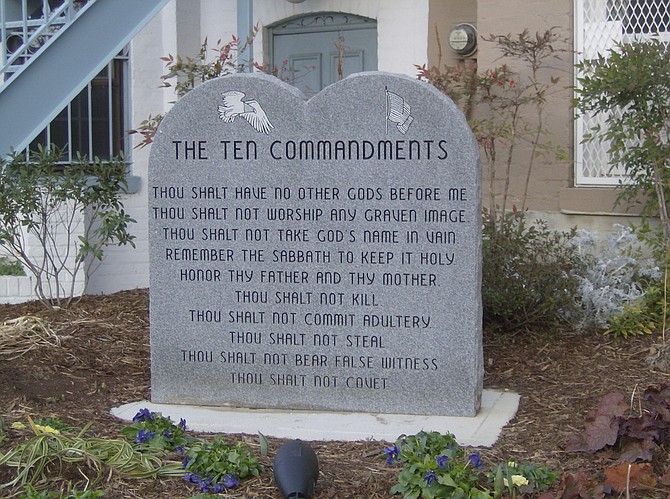LITTLE ROCK, Ark. (AP) — A man yelled "Freedom!" as he crashed his vehicle into Arkansas' new Ten Commandments monument early Wednesday, nearly three years after he was arrested in the destruction of Oklahoma's monument at its state Capitol, authorities said.
The privately funded Arkansas monument had been in place outside the state Capitol in Little Rock for less than 24 hours before it was knocked from its plinth and smashed to pieces.
Michael Tate Reed, 32, of Van Buren, Arkansas, was booked in the Pulaski County jail shortly after 7:30 a.m. on preliminary charges of defacing objects of public interest, criminal trespass and first-degree criminal mischief. An arrest report lists his occupation as "unemployed/disabled."
Authorities did not know whether he had an attorney who could speak on his behalf. A video arraignment was set for Thursday morning, a Pulaski County sheriff's spokesman said. A call to the number listed for Reed on a police report went straight to voicemail.
Arkansas Secretary of State's Office spokesman Chris Powell said officials believe a Facebook Live video posted on a Michael Reed's account that depicted the destruction is authentic.
In the video, the sky is dark and the Arkansas Capitol's dome is visible. Music is heard followed by a female voice, likely on the radio, saying, "Where do you go when you're faced with adversity and trials and challenges?" The driver is then heard growling, "Oh my goodness. Freedom!" before accelerating into the monument. The vehicle's speedometer is last shown at 21 mph (33 kph) and then a collision can be heard.
The monument fell and broke into multiple pieces as it hit the ground.
Oklahoma County sheriff's spokesman Mark Opgrande told The Associated Press on Wednesday that Reed was the same man arrested in October 2014 in the destruction of Oklahoma's Ten Commandments monument at the state Capitol.
In a 2015 email to the Tulsa World , Reed apologized for wrecking Oklahoma's monument and said he suffered from delusions and heard voices.
"I am so sorry that this all happening (sic) and wished I could take it all back," Reed said.
Arkansas' granite monument weighed 6,000 pounds (2,721 kilograms). It was installed Tuesday morning on the southwest lawn of the Capitol with little fanfare and no advance notice. A 2015 law required the state to allow the display near the Capitol, and a state panel last month gave final approval to its design and location.
"Obviously, I'm very disappointed that someone would carry out an act of violence that's actually against the people of Arkansas," said Republican Sen. Jason Rapert, the state lawmaker who led the push for the monument. Rapert said he was confident he could quickly raise funds for a replacement.
Travis Story, the general counsel of the American History and Heritage Foundation, which raised money for the monument, said the group already has ordered a replacement but that it would take a couple of months.
Republican Gov. Asa Hutchinson, who signed the legislation requiring the monument's installation, wrote in a tweet that "resorting to property destruction is never the answer to a policy disagreement."
The American Civil Liberties Union condemned the destruction of the monument, which it has called an unconstitutional endorsement of religion.
"We strongly condemn any illegal act of destruction or vandalism," ACLU of Arkansas Executive Director Rita Sklar said. "The ACLU remains committed to seeing this unconstitutional monument struck down by the courts and safely removed through legal means."
Arkansas' monument is a replica of a display at the Texas Capitol that was upheld by the U.S. Supreme Court in 2005. After Oklahoma's monument was destroyed in 2014, a replacement was erected but then ordered removed by that state's Supreme Court, which determined its location on state property violated a constitutional prohibition on the use of state funds to support a religion.
Family members told The Oklahoman in 2014 that Reed suffered from bipolar disorder and "some type of schizophrenia."
Oklahoma County District Attorney David Prater said he declined to pursue criminal charges against Reed because it was apparent he had a long history of mental illness and because the offense was a property crime. Prater said Reed's family lives in Arkansas and secured a facility there that could treat him.
"Had it been a violent crime where he had harmed another person, burglarized someone's home or something like that, I would have been forced to handle the case differently," Prater said.
Copyright Associated Press. All rights reserved. This material may not be published, broadcast, rewritten, or redistributed.



Comments
Use the comment form below to begin a discussion about this content.